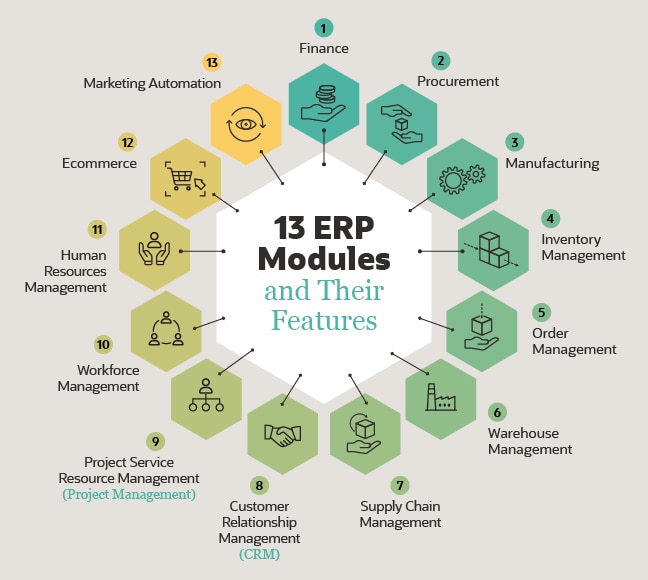Erp modules: types, features & functions
Today, I wanted to share some interesting information about Enterprise Resource Planning (ERP) systems. If you have ever wondered about the different types, features, and functions of ERP modules, you have come to the right place! So let's dive right in.
ERP Modules: Types, Features & Functions

One of the most comprehensive ERP modules infographics I found is provided by NetSuite. It beautifully depicts the various types of modules available within an ERP system. From finance and accounting to human resources and supply chain management, these modules cover a wide range of business functions.
Looking at the infographic, you can see that ERP modules are designed to help businesses streamline their operations, integrate various departments, and enhance overall efficiency. Each module serves a specific purpose and provides unique features to fulfill the requirements of different business areas.
What is an Enterprise Resource Planning (ERP) System?
When it comes to understanding ERP systems as a whole, Buddha Logic provides us with a concise explanation. An ERP system is a centralized software solution that integrates all the core business functions of an organization. Instead of using multiple standalone systems that don't talk to each other, an ERP system creates a unified platform that connects different departments, processes, and data sources.
By implementing an ERP system, businesses can gain significant advantages. They can streamline operations, improve productivity, reduce manual errors, and make more informed decisions. With a single source of truth for data, employees can access accurate and up-to-date information from various modules, which improves collaboration and ensures everyone is on the same page.
Now that we have explored the basics of ERP modules and systems, let's dive a little deeper into how they work and what benefits they bring to organizations.
The Power of ERP Modules
ERP modules are the building blocks of an ERP system. Each module focuses on a specific area, automating processes and providing functionalities tailored to the needs of that particular department. Let's take a closer look at some common ERP modules:
Finance and Accounting:
One of the core modules of an ERP system, the finance and accounting module ensures accurate financial management. It handles tasks such as general ledger, accounts payable and receivable, financial reporting, budgeting, and compliance.
Human Resources:
The HR module assists in managing employee data, recruitment, performance evaluations, payroll, benefits administration, and training. It helps streamline HR processes and ensures compliance with labor laws and regulations.
Supply Chain Management:
This module controls the flow of goods, from procurement to production and distribution. It includes functionalities such as inventory management, order fulfillment, demand forecasting, supplier management, and logistics optimization.
Customer Relationship Management:
The CRM module focuses on managing customer interactions, maintaining customer data, analyzing sales and marketing activities, and improving customer satisfaction. It helps businesses build stronger relationships with customers and drive sales growth.
These are just a few examples of the many ERP modules available. Each module plays a crucial role in integrating different business functions and ensuring a smooth flow of information across the entire organization.
In conclusion, ERP systems and modules are essential tools for modern businesses seeking to streamline their processes and enhance overall efficiency. By integrating various departments and providing a unified platform, ERP systems help organizations make better decisions, improve productivity, and stay competitive in the ever-evolving business landscape.
So, if you're considering implementing an ERP system for your organization, explore different modules available in the market and choose the ones that best meet your specific requirements. The benefits of ERP are vast, and with the right system in place, you can take your business to new heights!